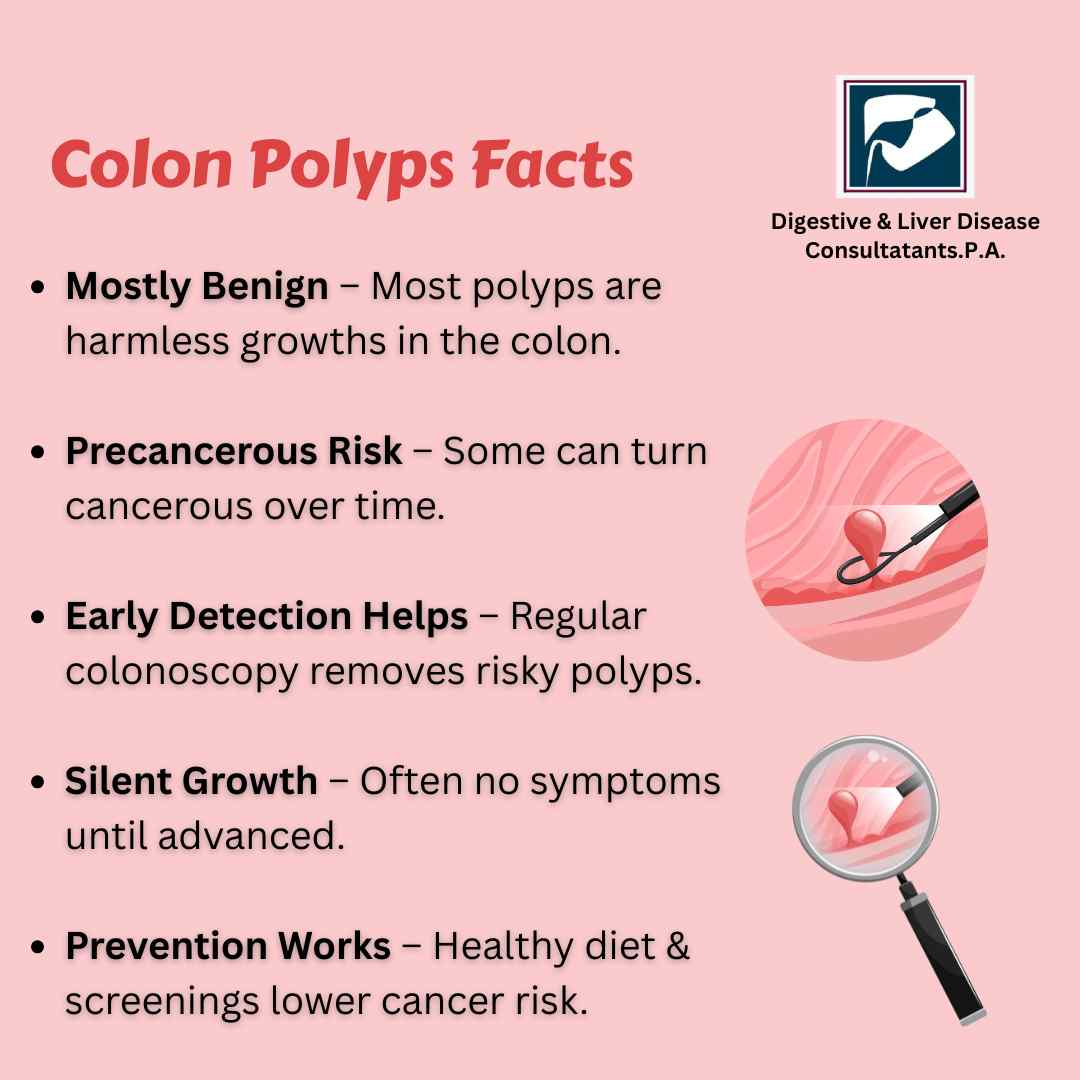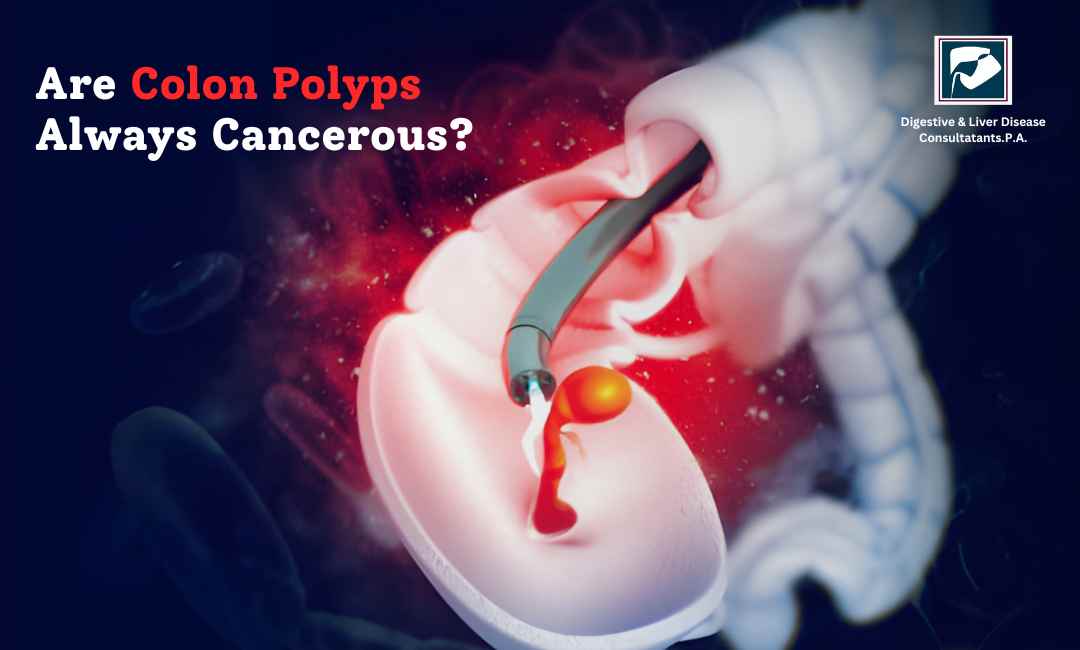Hearing that you have colon polyps during a colonoscopy can be worrying. Many people immediately associate polyps with cancer, but not all colon polyps are dangerous. In fact, most are harmless, especially when detected early and removed by a gastroenterologist.
Understanding what colon polyps are, why they develop, and how they’re treated can help ease anxiety and encourage you to stay on top of regular colon cancer screenings.
Let’s explore what colon polyps mean for your health and when they may become a concern.
What Are Colon Polyps?
Colon polyps are small growths that form on the inner lining of your large intestine (colon) or rectum. They are quite common, especially in adults over the age of 45. Most polyps are benign (noncancerous), but some can change over time and become cancerous if left untreated.
Polyps vary in size and shape — some are flat, while others resemble tiny mushrooms. The good news is that when found early, polyps can be safely removed during a routine colonoscopy, significantly lowering your risk of colon cancer.

Types of Colon Polyps
Not all polyps are the same. There are several types, and understanding them helps doctors determine cancer risk.
1. Adenomatous Polyps (Adenomas)
These are the most common type and have the potential to turn into cancer. However, most adenomas do not become cancerous. The risk increases with the size and number of adenomas found.
2. Hyperplastic Polyps
These are usually small and found in the lower part of the colon. They are typically benign and have a very low chance of turning cancerous.
3. Sessile Serrated Polyps (SSPs)
SSPs can sometimes develop into colon cancer if left untreated, particularly when they are large or located in the upper colon.
4. Inflammatory Polyps
Often seen in people with conditions like ulcerative colitis or Crohn’s disease, inflammatory polyps are usually noncancerous but indicate chronic inflammation of the colon lining.
What Causes Colon Polyps?
Polyps form when cells in the lining of the colon grow and divide more rapidly than normal. While the exact cause isn’t always clear, certain factors increase your risk of developing them:
Age: Most people over 45 are at higher risk.
Family history: Having a close relative with colon polyps or colon cancer raises your risk.
Lifestyle factors: Diets high in red or processed meats, low fiber intake, obesity, smoking, and excessive alcohol use.
Inflammatory bowel diseases: Conditions like ulcerative colitis or Crohn’s disease.
Genetic conditions: Some inherited syndromes, such as familial adenomatous polyposis (FAP) or Lynch syndrome, greatly increase the risk.
Symptoms of Colon Polyps
Many people with colon polyps don’t have any symptoms, which is why screening is essential. When symptoms do appear, they may include:
- Rectal bleeding or blood in stool
- Changes in bowel habits (diarrhea or constipation lasting more than a few days)
- Abdominal pain or cramping
- Iron deficiency anemia (caused by chronic bleeding)
If you notice these symptoms, it’s important to talk to your doctor promptly.
How Are Colon Polyps Diagnosed?
Most colon polyps are discovered during routine screening tests. The most effective and widely used screening tool is the colonoscopy.
Colonoscopy
During a colonoscopy, a gastroenterologist uses a thin, flexible tube with a camera to examine the entire colon. If polyps are found, they can usually be removed immediately during the procedure and sent for lab testing.
Other screening methods include:
Stool-based tests: These check for hidden blood or DNA changes in stool.
CT colonography (virtual colonoscopy): A noninvasive imaging test that examines the colon.
However, colonoscopy remains the gold standard because it allows both detection and removal of polyps in one visit.
Are Colon Polyps Always Cancerous?
No, most colon polyps are not cancerous. However, certain types, particularly adenomas and sessile serrated polyps, can gradually turn into cancer over time. This transformation typically takes several years, giving doctors a crucial window to detect and remove them before cancer develops.
This is why regular colon cancer screening is so important — it helps catch polyps early, when they are still harmless.
How Are Colon Polyps Treated?
Treatment usually involves polypectomy, which is the removal of polyps during a colonoscopy. This is a quick, safe procedure performed under mild sedation.
If a large or complex polyp cannot be removed during a standard colonoscopy, additional endoscopic techniques or surgery may be needed.
After removal, the tissue is sent to a pathology lab to determine if the polyp was precancerous or benign. Based on these results, your doctor will recommend how often you should return for follow-up colonoscopies.
Preventing Colon Polyps
While not all colon polyps can be prevented, you can reduce your risk through healthy lifestyle choices:
- Eat a diet rich in fruits, vegetables, and whole grains.
- Limit red and processed meats.
- Maintain a healthy body weight.
- Exercise regularly.
- Avoid smoking and limit alcohol consumption.
- Schedule regular colon cancer screenings starting at age 45 (or earlier if you have a family history).
These habits not only protect your digestive system but also improve your overall health.
About Digestive & Liver Disease Consultants, P.A.
At Digestive & Liver Disease Consultants, P.A., our team of experienced gastroenterologists provides advanced care for conditions affecting the digestive system, including colon polyps, colorectal cancer prevention, and other GI disorders.
We use state-of-the-art technology for colonoscopy and endoscopic procedures, ensuring safe and accurate diagnosis. Our goal is to help patients protect their colon health through early detection, expert treatment, and ongoing care.
With personalized care plans and a focus on prevention, we make it easier for patients to stay healthy and informed.
Conclusion
Colon polyps are common and usually harmless, but some can develop into colon cancer if left untreated. The best way to protect yourself is through regular colonoscopies and healthy lifestyle choices. Early detection saves lives — and removing polyps early can prevent colon cancer altogether.
If you have symptoms like rectal bleeding, changes in bowel habits, or a family history of colon polyps, it’s time to schedule a colonoscopy.
Contact Digestive & Liver Disease Consultants, P.A. today to book your appointment with our expert gastroenterologists.
Call now: 281-453-2050 | 281-440-0101






